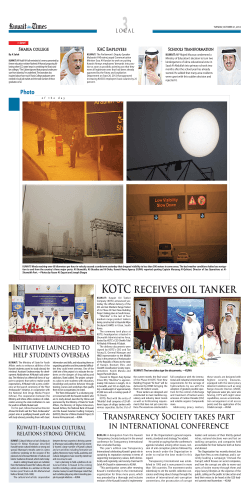
Al-Ali - Arab Times
ARAB TIMES, SUNDAY, DECEMBER 21, 2014 LOCAL 3 Prizes await top ten racers Kuwait’s National Heritage Festival competition kicks off KUWAIT CITY, Dec 20, (KUNA): Kuwait’s Fifth National Heritage Festival’s competition will commence with a women horse racing competition. “The competitions will start with that of an international women horse racing for 70km to be followed by men horse racing for 140km,” Deputy Head of the Competitions Committee Sheikh Sabah Fahad Al-Nasser Al-Sabah told KUNA Saturday. “The top ten racers will be given prizes and certificates of appreciation.” He added that the camel, sheep and goat racings and falcon beauty and fishing contests would start later. Sheikh Sabah Fahad disclosed that this year’s edition will last for 70 days and will include new activities. The national festival attracted this year over 5,600 participants, he said. Following a tour at festival avenue, Sheikh Sabah Al-Ahmad Cultural Heritage Village, Amiri Diwan Advisor Daifallah Sharar said that the large Gulf contribution will enrich Kuwait’s national heritage festival. He noted that the festival would be officially inaugurated on January 9th. He stated that an artificial lake was built inside the village on an area of 13,000 square meters to for activities to highlight the marine heritage of Kuwait and the Gulf countries. He went on to say that the festival will also have a number of restaurants providing with traditional meals. He stressed that the village has become a cultural landmark to people of Kuwait and the GCC thanks to the support of His Highness the Amir Sheikh Sabah Al-Ahmad Al-Jaber AlSabah. Govt officials’ financial disclosures key to battling ‘corruption’ – Al-Ali KANCOR to launch ops soon By Ahmed Al-Naqeeb Arab Times Staff KUWAIT CITY, Dec 20: Kuwait Anti-Corruption Authority (KANCOR) will shortly launch operations from its headquarters in Al-Shamiya after the necessary executive regulations and by-laws for the authority are issued. The Kuwaiti public has been awaiting the establishment of this authority since the announcement of its law in 2012 particularly after the Transparency International indicated in one of its reports about the high level of corruption in Kuwait compared to other GCC countries. Assistant Secretary-General of KANCOR Salem Ali Al-Ali, in an interview with Arab Times, disclosed that the delay in issuance of executive regulations and bylaws for the authority is due to the sensitivity of the authority’s operations. “Due to the existence of numerous governmental bodies that operates on similar fields, Fatwa and Legislation Department took its time to produce the executive regulations and by-laws in order to ensure that KANCOR’s operations do not overlap with that of other governmental bodies. However, we believe that the department has taken way too long for this process”, added AlAli. Battling Photos by Mohamed Khalaf Photos during the voting process Tunisian residents cast votes Large number of Tunisian residents of Kuwait visited their embassy on Friday to cast their votes in the second round of the presidential elections. The voting process, which was held at the embassy from 8 am to 6 pm on Friday, will continue until Sunday. The Tunisian Ambassador to Kuwait Nourdeen Al-Rai stressed that his country is currently going through a significant period of its modern history, which will end the political transitional period, adding that Tunisia went through four years of challenges and difficulties in implementing democracy. He expressed appreciation and gratitude to the State of Kuwait, its leadership and its people for their support in ensuring that the voting process takes place under the best possible conditions. He said financial disclosures by governmental officials are essential for battling corruption, which is why it will be the main focus of KANCOR’s operations. When asked to define financial disclosure, Al-Ali explained that it is the financial standing of an official in both assets and liabilities irrespective of whether it is loans, real estate, investments outside or inside the country and other factors of financial strength for the official. He said, “The most important part of this process is monitoring the financial standing of an official during his/her tenure, and flagging any unexplained financial gain, which then obligates the authority to investigate this gain through specialized committees”. When asked about who are obligated to submit their financial disclosures, Al-Ali said the spectrum is divided into four categories — the executive authority, the legislative authority, the judicial authority and others. Those of the executive authority starting from the Prime Minister and all the ministers in his Cabinet to the executive managers in each ministry are obliged to submit their financial disclosures. From the legislative authority, the head of parliaments and all the elected members are obliged to submit their financial disclosures. In addition, everyone affiliated to the judicial authority will be obligated to submit their financial disclosures including the head of the Cassation Court and all the judges under him irrespective of whether they are Kuwaiti citizens or non-Kuwaitis. Al-Ali further explained that the broad spectrum also includes other bodies such as cooperative societies, the Public Authority for Youth and Sports, Kuwait Investment Authority, as well as companies whose shares of 25 percent and more are held by the Kuwaiti government. He added that even the State Audit Bureau is also obliged to submit financial disclosures with no exceptions. Elaborating the objectives behind the financial disclosures as stipulated by the relevant law, he said the most important objective is the prevention of financial corruption followed by the protection of public funds, reinforcing control and stability within governmental institutions, immunizing public servants from political questioning that might harm their integrity, and assuring transparency in all governmental institutions. He stressed that the law is very clear and comprehensive regard- The KANCOR headquarters in Al-Salmiya ing the submission of financial disclosures. There are three main instances when the public servants are obliged to submit their financial disclosures. Those currently in service are obligated to submit their first disclosures within a year from the date of issuance of KANCOR’s executive regulations and by-laws. On the other hand, those who join the public service after the issuance of the executive regulations and by-laws are obligated to submit their first disclosures within 60 days of their employment. An update of the disclosures must be submitted every 3 years within 60 days of the due date, while the final disclosures should be submitted when the public servants decide to leave their positions or are terminated but within 90 days from the date of leaving the positions. In case any irregularities or unexplained increments within an official’s assets and financial standing are identified by KANCOR’s inspection committees, a case will be registered against the official and he/she will be summoned for questioning and investigation. Al-Ali affirmed that the investigative capabilities of the authority will be quite comprehensive and thorough, and it will be able to trace the assets of an official both locally and internationally. He urged all public servants to submit their disclosures correctly and on time in order to avoid penalties that range from fines to jail terms depending on the violation. He assured that all information included in disclosures will treated with extreme confidentiality using a system that the authority has developed with the assistance of international and local consultations for high-level confidentiality. Al-Ali affirmed that the relevant regulations prevent the employees of KANCOR from disclosing any infor- Salem Al-Ali mation obtained from the authority even after they resign from their positions. Based on Article 44 of the law, employees who do not comply with confidentiality regulations will be penalized. The authority is very strict in hiring its staff that will undergo numerous examinations ranging from IQ tests to management capabilities. Most of the authority’s higher management will be from the private sector and individuals with specialized background in law, financial forensic accounting and all relevant fields. Regarding the authority’s system of operation, Al-Ali explained that KANCOR is highly equipped to tackle its purpose whether it is for the delivery of disclosures, conducting investigations on financial irregularities or incompliance to confidentiality regulations. He revealed that KANCOR will also grant “whistle-blowing” service to the public so that any individual with solid information about financial irregularities of a legally-obligated person will be able to submit the relevant information to KANCOR, provided it is backed with evidences. In conclusion, the Assistant Secretary General of KANCOR Salem Ali Al-Ali conveyed a message to the Kuwaiti public, saying, “KANCOR is your weapon against corruption, so use it!” Donation brings light into people’s lives Alwaleed Foundation lights up 3 villages in Aseer RIYADH, Dec 20: Alwaleed Bin Talal Foundation* donated electric generators to three villages in Aseer region in Om Onayg, Altharwah and Asfal Aljafrah village. The number of homes benefiting from Alwaleed Foundation’s donation as part of the “Lighting up Towns & Villages” project are: ■ 71 houses for the Om Onayg Village ■ 58 houses for the Altharwah Village ■ 55 houses for the Asfal Aljafrah Village Lighting Up Towns & Villages has resulted in bringing light into people’s lives in Saudi Arabia’s most remote locations — 500 villages, benefiting over 43,527 households and over 212,000 people. The Foundation achieved this by installing electricity power generators that have a 10-year life span in thousands of villagers who benefited from the project. The national power grid does not cover these villages. However, they are listed to be connected with the grid during the lifetime of the generators. Lighting Up Lives exemplifies one of the basic tenets of Alwaleed Bin Talal Foundation: We offer help where it is needed desperately. Alwaleed Bin Talal Foundation, registered in Saudi Arabia, is chaired by HRH Prince Alwaleed Bin Talal Bin Abdulaziz Alsaud. News in Brief Ministry names beneficiaries: The Ministry of Finance has announced the weekly statistics for beneficiaries of the Kuwaiti Family Fund according to what has been mentioned by the banks administering this fund, reports Al-Anba daily. Banking sources said the number of applicants has reached 20,149, an increase of 3,000 over the previous week. The ministry clarified the transactions that were approved until Dec 14 were 17,883, adding the number of approvals documented by the Ministry of Justice was 15,618 for a total value of KD 375,209,308, while the banks continue to receive the demands. ❑ ❑ ❑ Kuwait signature sought: The GCC countries are waiting for Kuwait to put its signature on the GCC Security Pact to begin its implementation, reports Al-Qabas daily quoting sources. It has also been mentioned that the critical circumstances seen in the region are forcing to impose the highest security levels among the GCC countries, making the approval of the GCC Security Pact a necessity to protect them from external attacks. This is in addition to the importance of establishing a new coopera- tive mechanism to face different kind of terrorism, said the sources. ❑ ❑ ❑ Overcrowding delay flights: Due to the fast approaching New Year and Christmas holiday, Kuwait International Airport has been witness to excess numbers of passengers, as many citizens and expatriates leave the country to popular destinations like Dubai, Turkey, London and Cairo to spend the holiday. Besides the long queues, overcrowding delay the departure of several flights, reports Al-Seyassah daily. ❑ ❑ ❑ Bid to promote investment: Minister of Commerce and Industry AbdulMohsen Al-Mudej has issued Executive Regulations of Law No. 116/2013 regarding the promotion of direct investment in Kuwait, reports Al-Shahed daily. The regulation stipulates that the Commission shall encourage direct cash equivalent scheduled for collection for services. It is known as regulatory direct investment with the participation of another investor for capital directly in the investment entity within Kuwait and the license in accordance with the provisions of the law.
© Copyright 2026









